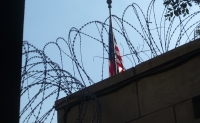U.S. Public Diplomacy in the Age of the Fortress Embassy: Balancing Mission and Security in the Post-Benghazi Era
Principal Investigator:
Mietek Boduszyński, CPD Research Fellow 2016-18
Contributing Researcher:
Lora Karch
The post-Benghazi emphasis on security over mission has put severe strain on the most basic functions of U.S. State Department public diplomacy. This project will 1) survey the effects of post-Benghazi security measures on public diplomacy operations in U.S. diplomatic missions around the world; 2) assess how Foreign Service Officers carrying out public diplomacy programs have adapted to the new operating environment; and 3) offer concrete policy prescriptions on how to best carry out core public diplomacy outreach and programs in the new environment. The focus will be on “high threat” diplomatic posts, which have proliferated in the past decade.
Diplomats and observers have noted that among the victims of the 11 September 2012 attacks on the U.S. diplomatic mission in Benghazi, Libya was a reasonable balance between mission and security in diplomatic operations. The turn toward extreme cautiousness was based on real security shortcomings in Libya, but it has also been the result of countless politically motivated investigations by Congress. Public diplomacy has been the primary “victim” of the new approach because cultural, educational, and media diplomacy is often deemed not to be “mission critical,” and thus “not worth the risk.” And nowhere has this highly restrictive approach been more evident than in posts that were already deemed “high threat,” especially in the Middle East and North Africa. As a result, public diplomacy officers have found it increasingly difficult to carry out core functions, including but not limited to: 1) recruiting and interviewing exchange participants; 2) implementing outreach programs such as speakers; 3) monitoring grants and cooperative agreements; 4) reaching diverse audiences outside of capital cities.
This has direct and negative consequences for U.S. ability to deliver key messages, foster people-to-people ties, and project “soft power” in a region at a time when such outreach is critical. Much of the MENA region is undergoing profound change stemming from the Arab Spring, the intensification of sectarianism and extremism, and the effects of at least four wars (Yemen, Libya, Iraq, Syria). Through an empirically-grounded research approach, this project will address three questions: 1) how has the post-Benghazi approach to security affected public diplomacy operations, 2) how have public diplomacy practitioners adapted to the new environment, and 3) what is the way forward?
Read Boduszynski's CPD Perspectives article, "Public Diplomacy and the American Fortress Embassy: Balancing Mission and Security," here.
Photo by Aslan Media | CC BY-NC-ND 2.0








